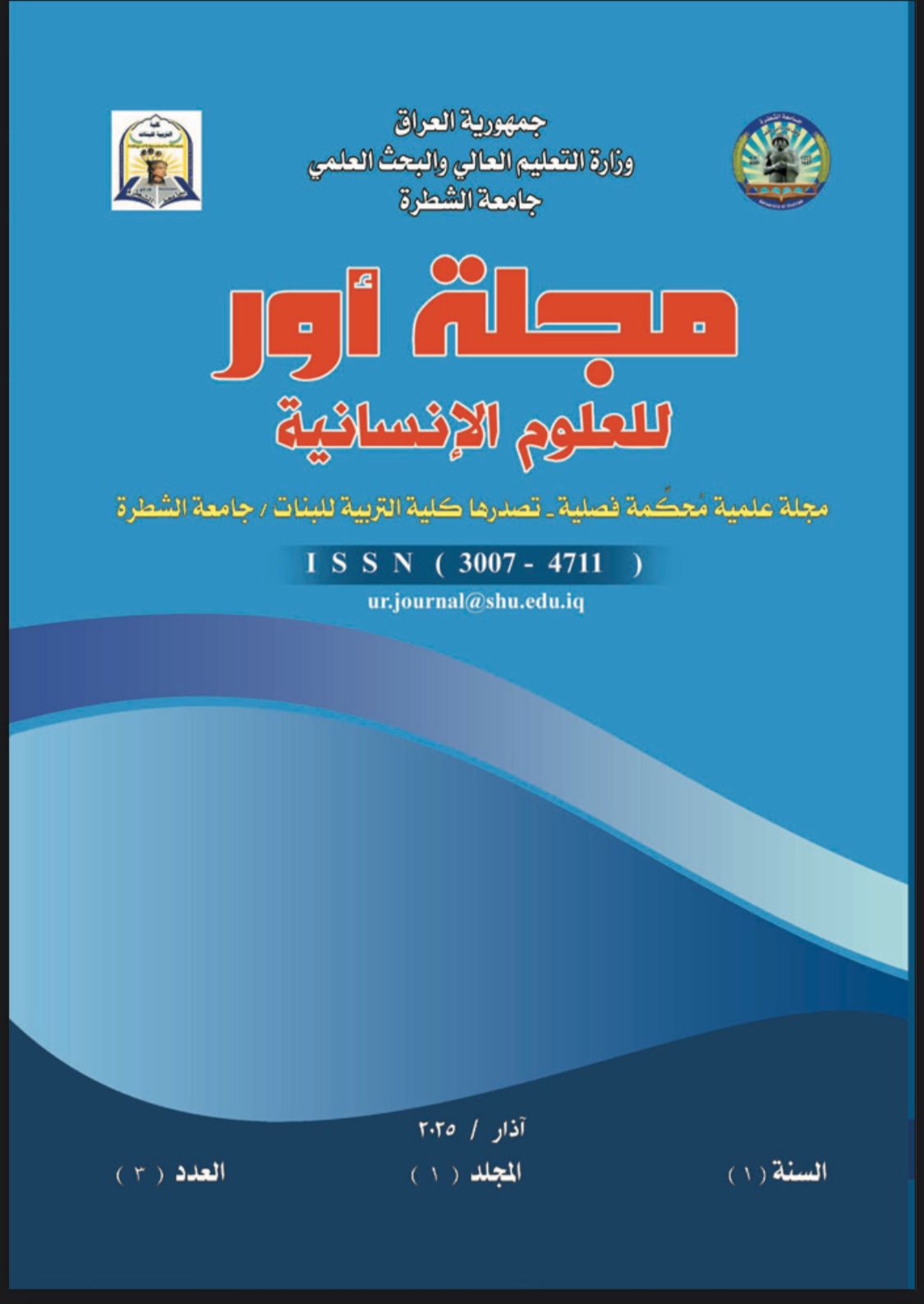Abstract
This study discusses the concept of arrogance and its negative effects on individuals and society, focusing on its definition, causes, and remedies, as well as distinguishing it from related terms such as pride and conceit, in light of Islamic texts and Quranic verses. The research can be summarized as follows:
Definition of Arrogance: Arrogance is the deliberate act of elevating oneself above others based on a false belief in an undeserved status. It differs from pride, which reflects an internal sense of self-superiority. True arrogance belongs to God alone, as His greatness and majesty are truthful and real
.
Types of Arrogance: Intrinsic and Attributive: Intrinsic arrogance is an inner feeling of superiority, while attributive arrogance relates to possessing wealth or social status.
Justified and Unjustified: Justified arrogance applies to the poor who rely on God, while unjustified arrogance is the rich looking down upon the poor.
Effects of Arrogance: Arrogance leads to negative traits such as self-exaltation in gatherings, strutting in one\'s walk, and despising others. It harms individuals, as demonstrated in the story of Iblis, who lost his position due to his arrogance. It also produces destructive societal impacts through disdain for others and violation of their rights.
Remedies for Arrogance: Humility is the primary treatment for arrogance.
Cultivating good character and self-reflection whenever signs of arrogance appear.
Distinction Between Arrogance and Conceit: Arrogance may be either justified or unjustified, while conceit always involves seeking grandeur without merit.
God is described as \"The Arrogant\" (Al-Mutakabbir) because He alone possesses true greatness and majesty, but He is never described as \"The Conceited\" (Al-Mustakbir) because He does not seek what does not befit Him.
Definition of Arrogance: Arrogance is the deliberate act of elevating oneself above others based on a false belief in an undeserved status. It differs from pride, which reflects an internal sense of self-superiority. True arrogance belongs to God alone, as His greatness and majesty are truthful and real
.
Types of Arrogance: Intrinsic and Attributive: Intrinsic arrogance is an inner feeling of superiority, while attributive arrogance relates to possessing wealth or social status.
Justified and Unjustified: Justified arrogance applies to the poor who rely on God, while unjustified arrogance is the rich looking down upon the poor.
Effects of Arrogance: Arrogance leads to negative traits such as self-exaltation in gatherings, strutting in one\'s walk, and despising others. It harms individuals, as demonstrated in the story of Iblis, who lost his position due to his arrogance. It also produces destructive societal impacts through disdain for others and violation of their rights.
Remedies for Arrogance: Humility is the primary treatment for arrogance.
Cultivating good character and self-reflection whenever signs of arrogance appear.
Distinction Between Arrogance and Conceit: Arrogance may be either justified or unjustified, while conceit always involves seeking grandeur without merit.
God is described as \"The Arrogant\" (Al-Mutakabbir) because He alone possesses true greatness and majesty, but He is never described as \"The Conceited\" (Al-Mustakbir) because He does not seek what does not befit Him.
Keywords
arrogance
Ethics
positive effects
Sunnah
Abstract
يناقش خلق التكبر وآثاره السلبية على الفرد والمجتمع، مع التركيز على تعريف التكبر وأسبابه وعلاجه، بالإضافة إلى الفرق بينه وبين مصطلحات مشابهة مثل الكبر والاستكبار، وذلك في ضوء النصوص الشرعية والآيات القرآنية. يمكن تلخيص محتواه البحث على النحو الاتي
تعريف التكبر: التكبر هو تكلف الترفع على الغير بناءً على اعتقاد غير صحيح بمنزلة لا يستحقها.
يختلف عن الكبر الذي يعبر عن إحساس داخلي بتفوق الذات.المتكبر بحق هو الله وحده، لأن عظمته وكبرياءه صادقة وواقعية. أنواع التكبر: ذاتي وصفاتي: التكبر الذاتي يتعلق بشعور داخلي بالتفوق، بينما الصفاتي يتصل بامتلاك المال أو الجاه. بحق أو بغير حق: التكبر بحق يكون للفقراء الذين يستغنون بالله، أما بغير حق فهو تكبر الأغنياء على الفقراء.
آثار التكبر: التكبر يقود إلى صفات سلبية مثل الترفع في المجالس، الاختيال في المشي، واحتقار الآخرين. يؤثر سلبًا على الفرد، كما يظهر في قصة إبليس الذي خسر مكانته بسبب تكبره. يُنتج آثارًا مجتمعية مدمرة من خلال ازدراء الآخرين والاعتداء على حقوقهم.
علاجات التكبر: التواضع كعلاج أساسي للتكبر. تربية النفس على الخُلق الحسن ومواجهة النفس عند ظهور أي بوادر تكبر. الفرق بين التكبر والاستكبار: التكبر قد يكون بحق أو بدون حق، بينما الاستكبار دائمًا ينطوي على طلب الكبر بغير استحقاق. الله يوصف بالمُتكبر لأنه يتفرد بالعظمة والكبرياء، ولا يُوصف بالمستكبر لأنه لا يطلب ما لا يليق به.
تعريف التكبر: التكبر هو تكلف الترفع على الغير بناءً على اعتقاد غير صحيح بمنزلة لا يستحقها.
يختلف عن الكبر الذي يعبر عن إحساس داخلي بتفوق الذات.المتكبر بحق هو الله وحده، لأن عظمته وكبرياءه صادقة وواقعية. أنواع التكبر: ذاتي وصفاتي: التكبر الذاتي يتعلق بشعور داخلي بالتفوق، بينما الصفاتي يتصل بامتلاك المال أو الجاه. بحق أو بغير حق: التكبر بحق يكون للفقراء الذين يستغنون بالله، أما بغير حق فهو تكبر الأغنياء على الفقراء.
آثار التكبر: التكبر يقود إلى صفات سلبية مثل الترفع في المجالس، الاختيال في المشي، واحتقار الآخرين. يؤثر سلبًا على الفرد، كما يظهر في قصة إبليس الذي خسر مكانته بسبب تكبره. يُنتج آثارًا مجتمعية مدمرة من خلال ازدراء الآخرين والاعتداء على حقوقهم.
علاجات التكبر: التواضع كعلاج أساسي للتكبر. تربية النفس على الخُلق الحسن ومواجهة النفس عند ظهور أي بوادر تكبر. الفرق بين التكبر والاستكبار: التكبر قد يكون بحق أو بدون حق، بينما الاستكبار دائمًا ينطوي على طلب الكبر بغير استحقاق. الله يوصف بالمُتكبر لأنه يتفرد بالعظمة والكبرياء، ولا يُوصف بالمستكبر لأنه لا يطلب ما لا يليق به.
Keywords
الاثار الوضعية
الاخلاق
التكبر
السنة النبوية
